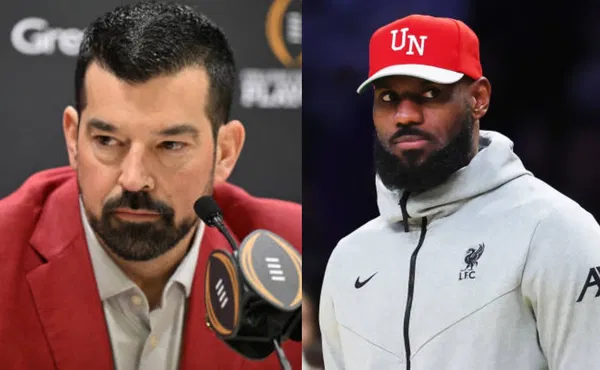
The term “true freshman” no longer holds the same meaning as it once did. The era of high school athletes struggling to adjust to the collegiate level is fading. Today’s young players arrive at the college level physically and mentally prepared, often requiring little to no transition period. This shift is exemplified by one standout player at Ohio State under head coach Ryan Day.
Jeremiah Smith: A Freshman Beyond His Years
Labeling Jeremiah Smith simply as a freshman or a prodigy might actually be an understatement. At just 19 years old, he has already earned recognition as one of the top players in the sport, particularly in his position group. Smith is breaking the mold, challenging traditional expectations, and dominating at an unprecedented level. His exceptional talent has led some to question whether the NFL’s eligibility rules should be reconsidered for players like him—not just for his benefit, but also for the sake of those forced to compete against him at the collegiate level.
On the College Football Addiction YouTube channel, host TJ Pittinger discussed Smith’s rapid development with Zach Smith, a former coach and Ohio State insider from Menace 2 Sports. Pittinger posed an intriguing question: “You coach this position. Is it physically possible for Jeremiah Smith to get better than he was in 2024?”
View this post on Instagram
Zach Smith responded with a statement that highlighted just how special Jeremiah is: “The scary part is, yeah. He still doesn’t understand really what he’s doing. He’s just so freaky and so talented…they talk about him like he works [hard] like no one ever has, and he seems like a pretty smart kid. So once he starts to learn the intricacies of coverages, of attacking defenders…I think you’re going to see not a sophomore slump, like a sophomore explosion…I don’t even know what his ceiling is!”
This analysis led Pittinger to question whether players like Smith, who are clearly ready for the next level, should be allowed to enter the NFL earlier than the current rules permit.
A Call for a Rule Change?
The NFL mandates that players must be at least three years removed from high school before they can enter the league. This means Smith would have to play two more seasons in college before declaring for the draft. However, Pittinger argued that this restriction is almost unfair—not only to Smith but also to the rest of college football.
“It’s almost unfair that [Jeremiah Smith] has to play two more years in college football. Not only to him but to the rest of the Big Ten, the rest of college football,” Pittinger remarked. If Smith continues to develop at this rate, he could potentially make college football uncompetitive, as defenses struggle to contain him.
Pittinger also acknowledged that he hadn’t previously considered an NFL rule change, but Smith’s case makes it a valid discussion. “If there was ever a player to change it for, it would be him. He would be the first wide receiver taken this year! There’s no question about that!” Zach Smith agreed, adding that Jeremiah’s talent and dominance justify a closer look at the NFL’s eligibility rules.
A Historical Perspective
Sports history has seen several generational athletes push boundaries and force rule changes. Over 20 years ago, LeBron James marked the end of high school players entering the NBA directly. Before that, Kareem Abdul-Jabbar’s dominance led the NCAA to ban dunking for a decade. While it may seem premature to compare Smith to these legendary figures, he is beginning to shape a similar narrative.
Another factor that makes Smith’s case unique is the relatively short career span for wide receivers in the NFL. Allowing elite talents like him to enter the league earlier could maximize their earning potential and longevity in professional football.
Financial Security Through NIL
Despite the NFL’s restrictions, Smith is not missing out financially. The introduction of Name, Image, and Likeness (NIL) deals has blurred the lines between college and professional earnings. Remarkably, Smith is already wealthier than some long-time NFL veterans.
During an appearance on the I AM ATHLETE podcast, Smith, along with his Ohio State teammates Carnell Tate and former teammate Emeka Egbuka, discussed NIL earnings with former NFL receiver Brandon Marshall. Marshall was taken aback by the numbers Smith revealed. “Y’all make more money than half the receivers in the league. They probably hate y’all!” he joked.
The financial disparity became even more evident when Smith showed his earnings to Marshall, who reacted with disbelief. “Yo! Jeremiah got more money than me!” he exclaimed.
Given his dominance on the field and his financial security off it, Smith is in a rare position. He is expected to continue playing at an elite level for Ohio State in the coming seasons, further cementing his status as one of the most exceptional talents college football has ever seen.
The Future of College Football and the NFL
While the NFL is unlikely to change its eligibility rules in the immediate future, Smith’s situation presents an interesting dilemma for decision-makers in the sport. He may not be the last player to raise this issue, and his success could set a precedent for future discussions.
For now, Smith remains a key figure in Ryan Day’s Ohio State program, poised to take his game to even greater heights. His future in football looks incredibly bright, whether or not the NFL adjusts its rules to accommodate prodigies like him.